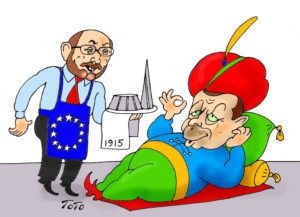 By Edmond Y. Azadian
By Edmond Y. Azadian
Justice delayed is justice denied. But how about justice overturned, which is the case with the European Court of Human Rights? The court justified Genocide denial by an official, namely Dogu Perinçek, representing the successor state of the one which had perpetrated the Armenian Genocide.
That action had a domino effect on the Swiss Court, which in turn reversed its verdict on Perinçek, whom a lower court had convicted of Genocide denial, and, adding insult to injury, ordered the survivors of the Genocide to indemnify Genocide denial.
Europe and the US boast of being countries of laws, whereas they constantly trade justice against political interests.
At the end of the Cold War, it was an alienable principle not to change any territorial borders. Never mind that Timor-Leste declared independence in 2002, the country of South Sudan was created in 2011, amputated from the country of Sudan and, most abominably, the former Yugoslavia was fragmented, creating several independent countries; and to punish Serbia for its aggression and serving as an extension of Russia’s policies in Europe, a piece of its land was severed to form an artificial country called Kosovo in 2008, ruled by gunrunners, drug dealers and terrorists.
To this day, Kosovo remains under NATO protection, despite the fact that it has become a training camp for Islamic terrorists and fundamentalists in Europe.









